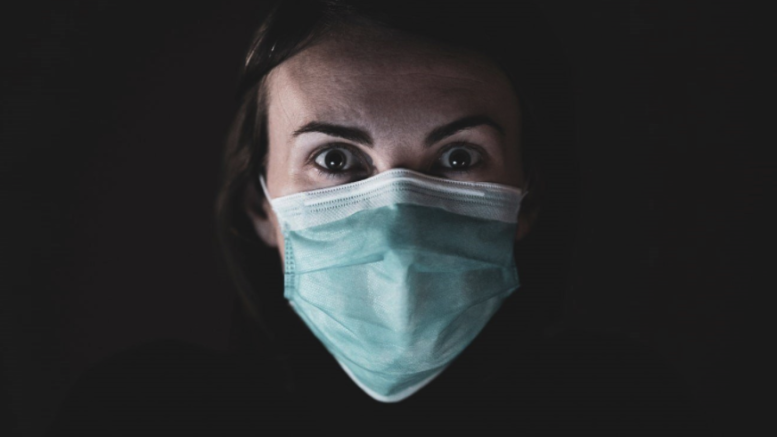
Blaylock: Face Masks Pose Serious Risks To The Healthy
- Dr. Russell Blaylock warns that not only do face masks fail to protect the healthy from getting sick, but they also create serious health risks to the wearer. The bottom line is that if you are not sick, you should not wear a face mask.
As businesses reopen, many are requiring shoppers and employees to wear a face mask. Costco, for instance, will not allow shoppers into the store without wearing a face mask. Many employers are requiring all employees to wear a face mask while at work. In some jurisdictions, all citizens must wear a face mask if they are outside of their own home. ⁃ TN Editor
With the advent of the so-called COVID-19 pandemic, we have seen a number of medical practices that have little or no scientific support as regards reducing the spread of this infection. One of these measures is the wearing of facial masks, either a surgical-type mask, bandana or N95 respirator mask. When this pandemic began and we knew little about the virus itself or its epidemiologic behavior, it was assumed that it would behave, in terms of spread among communities, like other respiratory viruses. Little has presented itself after intense study of this virus and its behavior to change this perception.
This is somewhat of an unusual virus in that for the vast majority of people infected by the virus, one experiences either no illness (asymptomatic) or very little sickness. Only a very small number of people are at risk of a potentially serious outcome from the infection—mainly those with underlying serious medical conditions in conjunction with advanced age and frailty, those with immune compromising conditions and nursing home patients near the end of their lives. There is growing evidence that the treatment protocol issued to treating doctors by the Center for Disease Control and Prevention (CDC), mainly intubation and use of a ventilator (respirator), may have contributed significantly to the high death rate in these select individuals.
- By wearing a mask, the exhaled viruses will not be able to escape and will concentrate in the nasal passages, enter the olfactory nerves and travel into the brain.
Russell Blaylock, MD
As for the scientific support for the use of face mask, a recent careful examination of the literature, in which 17 of the best studies were analyzed, concluded that, “ None of the studies established a conclusive relationship between mask/respirator use and protection against influenza infection.” 1 Keep in mind, no studies have been done to demonstrate that either a cloth mask or the N95 mask has any effect on transmission of the COVID-19 virus. Any recommendations, therefore, have to be based on studies of influenza virus transmission. And, as you have seen, there is no conclusive evidence of their efficiency in controlling flu virus transmission.
It is also instructive to know that until recently, the CDC did not recommend wearing a face mask or covering of any kind, unless a person was known to be infected, that is, until recently. Non-infected people need not wear a mask. When a person has TB we have them wear a mask, not the entire community of non-infected. The recommendations by the CDC and the WHO are not based on any studies of this virus and have never been used to contain any other virus pandemic or epidemic in history.
Now that we have established that there is no scientific evidence necessitating the wearing of a face mask for prevention, are there dangers to wearing a face mask, especially for long periods? Several studies have indeed found significant problems with wearing such a mask. This can vary from headaches, to increased airway resistance, carbon dioxide accumulation, to hypoxia, all the way to serious life-threatening complications.
There is a difference between the N95 respirator mask and the surgical mask (cloth or paper mask) in terms of side effects. The N95 mask, which filters out 95% of particles with a median diameter >0.3 µm 2 , because it impairs respiratory exchange (breathing) to a greater degree than a soft mask, and is more often associated with headaches. In one such study, researchers surveyed 212 healthcare workers (47 males and 165 females) asking about presence of headaches with N95 mask use, duration of the headaches, type of headaches and if the person had preexisting headaches. 2
They found that about a third of the workers developed headaches with use of the mask, most had preexisting headaches that were worsened by the mask wearing, and 60% required pain medications for relief. As to the cause of the headaches, while straps and pressure from the mask could be causative, the bulk of the evidence points toward hypoxia and/or hypercapnia as the cause. That is, a reduction in blood oxygenation (hypoxia) or an elevation in blood C02 (hypercapnia). It is known that the N95 mask, if worn for hours, can reduce blood oxygenation as much as 20%, which can lead to a loss of consciousness, as happened to the hapless fellow driving around alone in his car wearing an N95 mask, causing him to pass out, and to crash his car and sustain injuries. I am sure that we have several cases of elderly individuals or any person with poor lung function passing out, hitting their head. This, of course, can lead to death.
A more recent study involving 159 healthcare workers aged 21 to 35 years of age found that 81% developed headaches from wearing a face mask. 3 Some had pre-existing headaches that were precipitated by the masks. All felt like the headaches affected their work performance.
Unfortunately, no one is telling the frail elderly and those with lung diseases, such as COPD, emphysema or pulmonary fibrosis, of these dangers when wearing a facial mask of any kind—which can cause a severe worsening of lung function. This also includes lung cancer patients and people having had lung surgery, especially with partial resection or even the removal of a whole lung.
While most agree that the N95 mask can cause significant hypoxia and hypercapnia, another study of surgical masks found significant reductions in blood oxygen as well. In this study, researchers examined the blood oxygen levels in 53 surgeons using an oximeter. They measured blood oxygenation before surgery as well as at the end of surgeries. 4 The researchers found that the mask reduced the blood oxygen levels (pa0 2 ) significantly. The longer the duration of wearing the mask, the greater the fall in blood oxygen levels.
The importance of these findings is that a drop in oxygen levels (hypoxia) is associated with an impairment in immunity. Studies have shown that hypoxia can inhibit the type of main immune cells used to fight viral infections called the CD4+ T-lymphocyte. This occurs because the hypoxia increases the level of a compound called hypoxia inducible factor-1 (HIF-1), which inhibits T-lymphocytes and stimulates a powerful immune inhibitor cell called the Tregs. . This sets the stage for contracting any infection, including COVID-19 and making the consequences of that infection much graver. In essence, your mask may very well put you at an increased risk of infections and if so, having a much worse outcome. 5,6,7
People with cancer, especially if the cancer has spread, will be at a further risk from prolonged hypoxia as the cancer grows best in a microenvironment that is low in oxygen. Low oxygen also promotes inflammation which can promote the growth, invasion and spread of cancers. 8,9 Repeated episodes of hypoxia has been proposed as a significant factor in atherosclerosis and hence increases all cardiovascular (heart attacks) and cerebrovascular (strokes) diseases. 10
There is another danger to wearing these masks on a daily basis, especially if worn for several hours. When a person is infected with a respiratory virus, they will expel some of the virus with each breath. If they are wearing a mask, especially an N95 mask or other tightly fitting mask, they will be constantly rebreathing the viruses, raising the concentration of the virus in the lungs and the nasal passages. We know that people who have the worst reactions to the coronavirus have the highest concentrations of the virus early on. And this leads to the deadly cytokine storm in a selected number.
It gets even more frightening. Newer evidence suggests that in some cases the virus can enter the brain. 11,12 In most instances it enters the brain by way of the olfactory nerves (smell nerves), which connect directly with the area of the brain dealing with recent memory and memory consolidation. By wearing a mask, the exhaled viruses will not be able to escape and will concentrate in the nasal passages, enter the olfactory nerves and travel into the brain. 13
It is evident from this review that there is insufficient evidence that wearing a mask of any kind can have a significant impact in preventing the spread of this virus. The fact that this virus is a relatively benign infection for the vast majority of the population and that most of the at-risk group also survive, from an infectious disease and epidemiological standpoint, by letting the virus spread through the healthier population we will reach a herd immunity level rather quickly that will end this pandemic quickly and prevent a return next winter. During this time, we need to protect the at-risk population by avoiding close contact, boosting their immunity with compounds that boost cellular immunity and in general, care for them.
One should not attack and insult those who have chosen not to wear a mask, as these studies suggest that is the wise choice to make.
References
- bin-Reza F et al. The use of mask and respirators to prevent transmission of influenza: A systematic review of the scientific evidence. Resp Viruses 2012;6(4):257-67.
- Zhu JH et al. Effects of long-duration wearing of N95 respirator and surgical facemask: a pilot study. J Lung Pulm Resp Res 2014:4:97-100.
- Ong JJY et al. Headaches associated with personal protective equipment- A cross-sectional study among frontline healthcare workers during COVID-19. Headache 2020;60(5):864-877.
- Bader A et al. Preliminary report on surgical mask induced deoxygenation during major surgery. Neurocirugia 2008;19:12-126.
- Shehade H et al. Cutting edge: Hypoxia-Inducible Factor-1 negatively regulates Th1 function. J Immunol 2015;195:1372-1376.
- Westendorf AM et al. Hypoxia enhances immunosuppression by inhibiting CD4+ effector T cell function and promoting Treg activity. Cell Physiol Biochem 2017;41:1271-84.
- Sceneay J et al. Hypoxia-driven immunosuppression contributes to the pre-metastatic niche. Oncoimmunology 2013;2:1 e22355.
- Blaylock RL. Immunoexcitatory mechanisms in glioma proliferation, invasion and occasional metastasis. Surg Neurol Inter 2013;4:15.
- Aggarwal BB. Nucler factor-kappaB: The enemy within. Cancer Cell 2004;6:203-208.
- Savransky V et al. Chronic intermittent hypoxia induces atherosclerosis. Am J Resp Crit Care Med 2007;175:1290-1297.
- Baig AM et al. Evidence of the COVID-19 virus targeting the CNS: Tissue distribution, host-virus interaction, and proposed neurotropic mechanisms. ACS Chem Neurosci 2020;11:7:995-998.
- Wu Y et al. Nervous system involvement after infection with COVID-19 and other coronaviruses. Brain Behavior, and Immunity, In press.
- Perlman S et al. Spread of a neurotropic murine coronavirus into the CNS via the trigeminal and olfactory nerves. Virology 1989;170:556-560.

Dr. Russell Blaylock, author of The Blaylock Wellness Report newsletter, is a nationally recognized board-certified neurosurgeon, health practitioner, author, and lecturer. He attended the Louisiana State University School of Medicine and completed his internship and neurological residency at the Medical University of South Carolina. For 26 years, practiced neurosurgery in addition to having a nutritional practice. He recently retired from his neurosurgical duties to devote his full attention to nutritional research. Dr. Blaylock has authored four books,
- Excitotoxins: The Taste That Kills ,
Health and Nutrition Secrets That Can Save Your Life ,
Natural Strategies for Cancer Patients ,
and his most recent work, Cellular and Molecular Biology of Autism Spectrum Disorders .